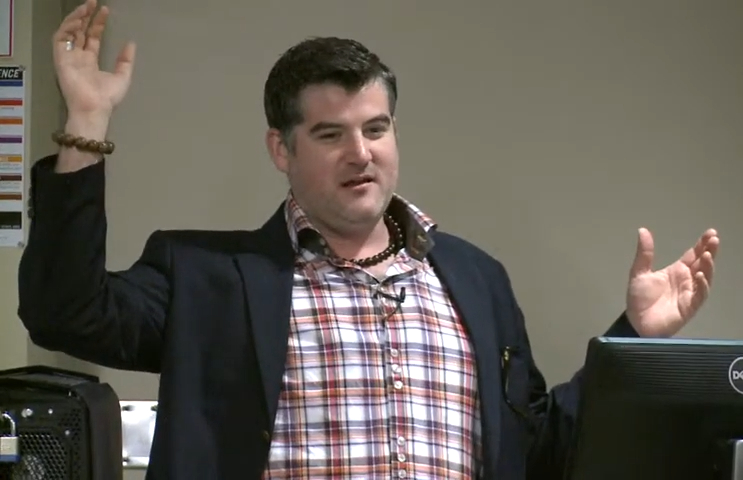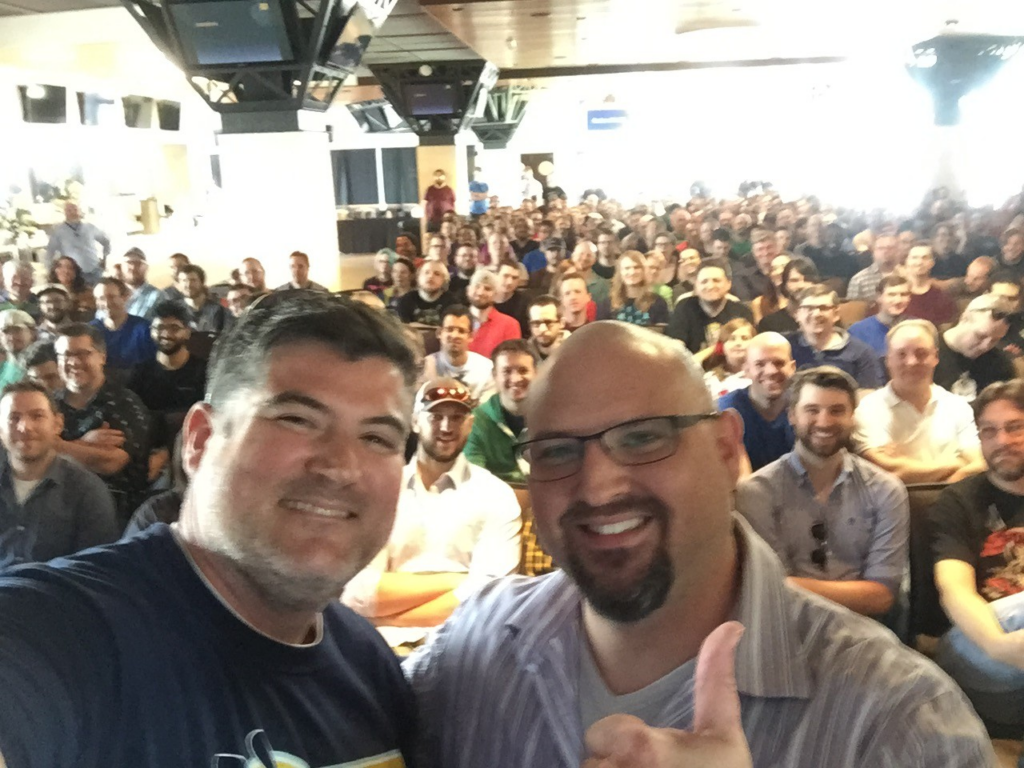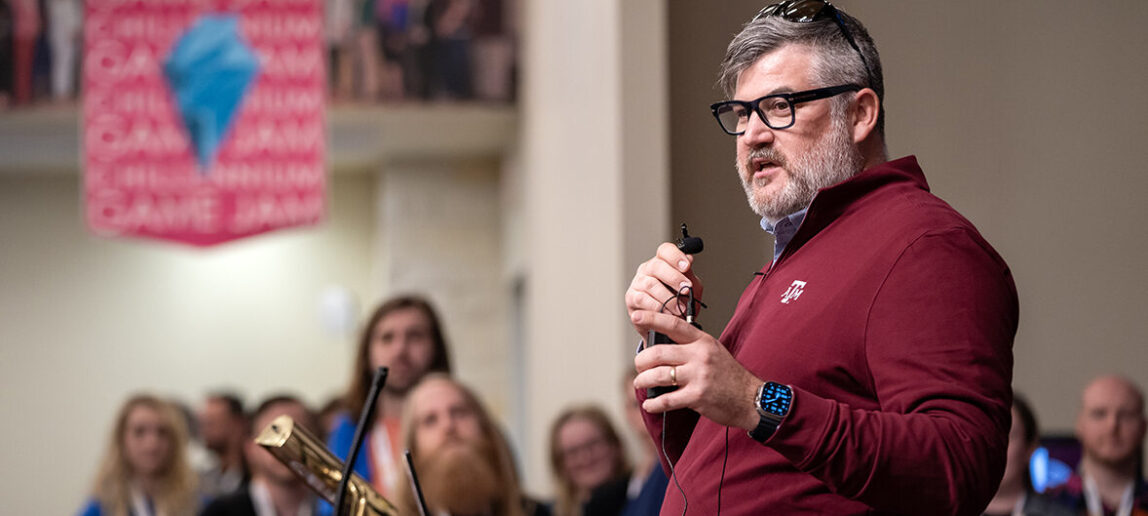‘A Great Energy Here’: Aaron Thibault Brings Academic And Industry Expertise To Game Design Program
Aaron Thibault’s passion for video games goes back as far as he can remember. As a child growing up in Rhode Island, he learned how to program his own games on a TRS-80 — back before saving such games was even possible.
This interest was buoyed by family members who brought a variety of arts and sciences to Thibault’s life. He turned it into a career through industry (Origin, Electronic Arts and Gearbox Software) and academia (University of Texas and Southern Methodist University).
Thibault is in his first year as director of games and esports and associate professor of practice for the Texas A&M College of Performance, Visualization and Fine Arts. He took the baton from the influential André Thomas, who established the LIVE Lab, served as adviser to the Texas A&M esports team and played a leading role in the Visualization program’s gaming curriculum.
“I’ve received the warmest welcome,” Thibault said. “I’m still drinking out of the firehose between research and continued development on projects — and our Game Design and Development minor, which we’re looking to expand. Everybody is so positive and welcoming, and there’s a great energy here. That really goes a long way to make it easy to step in and commit to all the hard work that has to be done to be successful.
“I really think that Texas A&M represents the best merging of technology, art, philosophy and common-sense management practices that the game industry sorely needs more of.”
Tim McLaughlin, dean of the College of Performance, Visualization and Fine Arts, said Thibault’s background, energy and ideas are an ideal fit.
“Our students prepare for two things that we expect will be a part of their careers post-graduation: translating creative thinking into real-world problem-solving using technology, and working collaboratively,” he said. “Aaron’s teaching, and the leadership he brings to the LIVE Lab and esports, embody both.”
Ready Player One
Thibault had early encouragement from family members including his mother (a restaurateur and culinary arts entrepreneur); his grandfather (a researcher, engineer, physics professor and a radio operator in World War II); and his grandmother (a painter and officer of the Rhode Island Watercolor Society).
Game inspiration came from Thibault’s grandfather, who taught him to write and program his own games on the TRS-80. He would build upon a tutorial’s instructions to add interactivity of movement. Some games took a few hours to complete, some took a few days.
“It was almost the equivalent of ‘Flappy Bird,’ fun examples of better-known games,” he said. “If you have a bouncing ball, try to add movement with the arrows to get it to go into a hole in the wall, like the ancient Mayan ball game. Or simple, single-player racing games, simple platform adventures. Things that if I lost them, it wouldn’t be the end of the world, but were fun to keep running on the machine as long as possible — until I had to wipe them and start over.”
Thibault thrived in the early-’80s video game boom, noting that he was among the lucky ones to get the game-changing Atari 2600 console the first year it was available. Like most kids in that era, he was naturally swept up in “Pac-Man” fever, though he preferred its spinoff, “Ms. Pac-Man.”
When Thibault’s mother was hired to lead hospitality at Brandeis University in Massachusetts, Thibault found a free arcade for students in the commissary. With a box to stand on, he beat the high scores on games including “Mario Bros,” “Galaga,” “Robotron” and “Spy Hunter.”
“I was there more than the college students,” he said with a laugh.
Move To Texas
Thibault moved to Houston in 1987, and enrolled at the University of Texas in 1993. He pursued media projects there including photography, hosting a syndicated music video show for MuchMusic and serving as a master control operator and audio technician at the CBS affiliate. Thibault helped to start the student TV station, TSTV, which earned FCC approval, and to take student radio station KVRX from cable radio to an FM broadcast station.
With a degree in communication/radio, television and film, Thibault first began working in games for Origin Systems, a game development company in Austin that had been bought by Electronic Arts in 1992. He started as an audio intern, then was quickly promoted to sound designer, technical animator, cinematic director and external producer. He put together teams to take on projects including creating marketing trailers and videos and updating art and content for games, along with creating processes to onboard college interns into development teams.
As Thibault pondered his next move, he began thinking about “a new kind of company.” He wanted to explore opportunities for making games and interactive media by incorporating research and development he had worked on that didn’t yet exist in the market. He found a kindred spirit in George Kozmetsky, cofounder of Teledyne, dean of UT’s College of Business Administration and founder of the IC² Institute economic think tank.
Kozmetsky had financed a game called “Moon Base” about colonizing the moon, and the World War II veteran aimed for it to help the U.S. Army War College think differently about the future and wars over resources, Thibault said.
“He had a real passion for game-based learning,” Thibault said. “Just before I talked to him, he had funded a lab called the E-Learning and Training Labs — ELT Labs — which helped his mentee, Michael Dell, hire all the kinds of people he needed to grow his company.”
Thibault and Kozmetsky were aligned in a focus of artificial intelligence, andragogy — the way adults think and learn — and multiplayer online technology. Mass customized learning could be enhanced by game technology, which could then benefit scaling learning and the global economy, he said, and new methods of managing creative people would enhance those efforts.
In three years with IC², Thibault contributed to a number of projects. The Army was going through a digital transformation prior to Operation Iraqi Freedom, he said, and he helped to develop a decision-making training platform.
“It brought together the needs of warfighters and support servicemen and women across medical and logistics and information systems,” he said. “We fielded a game-based training platform that had a very flexible scenario-development framework.”

Thibault also helped to implement the first game design classes at UT and served as co-professor of the inaugural class.
His next stop was Southern Methodist University in Dallas in 2005, where he served as deputy director and lecturer for game development, a program known as SMU Guildhall. Thibault was instrumental in starting the world’s first graduate degree program in game development there, which was designed to reflect true needs of the game industry to provide the best career opportunities for students, he said. A team of professionals — known as Guild Masters — served as mentors and represented the wide range of disciplines within the industry.
“We were extremely entrepreneurial,” Thibault said. “We started advertising the program before we had all the faculty hired to gauge worldwide interest in a program like this. We got a lot of positive feedback and interest and pre-enrollment requests. So that gave us the encouragement to start the program with the gifts we had received from Linda and Mitch Hart, which established the Hart eCenter. It quicky evolved to be its own standalone program because of how popular it was.”
Thibault said it was “rewarding and satisfying” to launch the first graduate program for game development, and the game industry responded accordingly.
“It quickly became known that this was the place for recruiters to go if they wanted to get the best and brightest students for their jobs,” he said. “And because we came from industry, all of us who founded the program, we were able to work through our networks to understand the needs the hiring managers had, as well shape our curriculum to what that future looked like and to seed opportunities for students. It was hugely gratifying.”
Return To Industry
The industry came calling again in 2007, and Thibault moved a bit further north to Frisco, where he joined Gearbox Software. He helped envision new games and intellectual property and to improve and standardize practices and production processes, serving as vice president of product development, then vice president of strategic operations and executive director of Gearbox Gives.

A key project for Gearbox was “Borderlands,” the first-person shooter that debuted in 2009. The game sold 2 million copies that year, leading to a series of sequels and spinoffs.
“The reception that the world had to ‘Borderlands’ when we launched the first game was amazing,” Thibault said. “It’s a huge highlight in my career. Working with that team was one of the best experiences I’ve ever had, until I got to work with the ‘Borderlands 2’ team, which somehow surpassed it.”
Other highlights in his 16-year stay at Gearbox included the patriotic storylines developed in the “Brothers in Arms” World War II franchise, and the evolution of the “Duke Nukem” alien-invasion shooter series. Gearbox hired an entire graduating class of SMU Guildhall students to make a bundled, virtual-reality title for “Borderlands.”
A pattern has evolved in Thibault’s career, he noted: Jump into innovative work in industry, then contemplate how that work and the processes could be improved upon, and transition to a place where experimentation and innovation thrive. That tends to be back in academia, he said, but with an important connection back to industry.
Thibault had long established ties to the Texas A&M Visualization program while at Gearbox. He served as an industry adviser to the program and to the annual Chillennium game jam. He also partnered with Dean Tim McLaughlin to develop a near-peer mentoring program for the Longview Independent School District, bringing graduate students from Texas A&M and Prairie View A&M to help middle-school students see a career path in STEM and in video games.
“We continue that today,” he said. “One of my passion areas is career pathway education for young people.”
Howdy, Aggieland
Thibault’s ties to the Visualization program opened the door for his new role as director of games and esports and associate professor of practice, which began in the spring.
“The level of collaboration that I’ve had with the Visualization program and the eagerness to reshape the world of education for better, with better practices in making games and media, is very appealing to me,” he said. “The reputation of Texas A&M students to do the hard things in games and technical art has been impressive. And I wanted to be part of that, and in helping to define how this next generation of practitioners and thinkers learn their craft and get connected with making future products.”
This year’s Chillennium was his first as the faculty adviser, the role originated by André Thomas, who recently joined Lucerne University of Applied Sciences and Arts in Switzerland. Thibault’s time at Electronic Arts overlapped with Thomas, and he said the two are aligned in their goals.
“I’m here doing this mostly because of André,” he said. “André had the vision to come here, to create the LIVE Lab, to incorporate these advanced ways of thinking into production practices and to collaborate with the right industry partners in doing that. He had a vision, and I really appreciate that vision. And I’m fortunate that the structures are in place here. I’m working with a healthy situation between ongoing research, people who now are accustomed to working between applications and research for games, as well as the competitive aspects. I think what he did was wonderful, and I want to continue it.”
The research happening at the College of Performance, Visualization and Fine Arts was an additional draw in coming to Aggieland, Thibault said, as was the school’s support in pursuing game-based learning. And the Texas A&M esports community, which Thomas was essential in fostering, is poised to grow. The team recently won the National VALORANT Championship.
“This was too attractive of a proposition to be a part of,” Thibault said. “I wouldn’t want to look back later at what could’ve been with these amazing resources, with this level of support, with these incredible students and the faculty here. It just creates a real gravity here that I don’t see in other venues, either corporate or academic. It’s the best of all worlds.”
Top photo by Laura McKenzie/Texas A&M University Division of Marketing & Communications.

